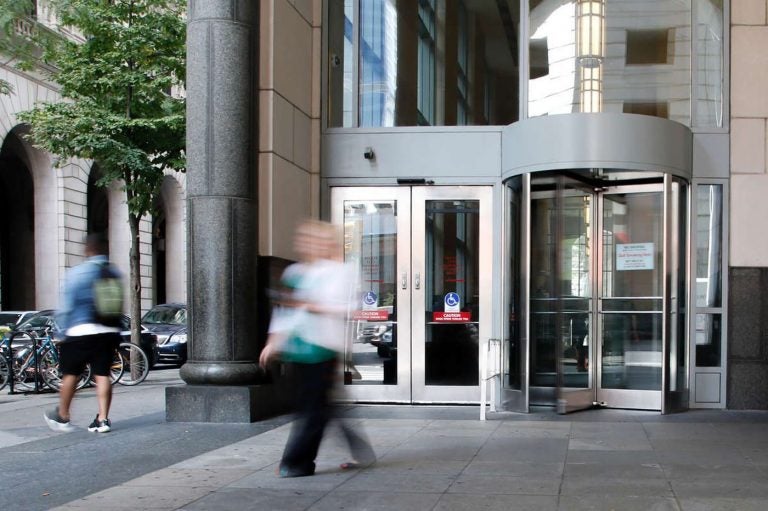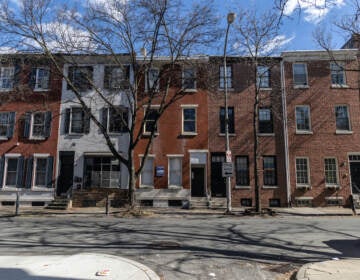Why Pennsylvania jury duty pays $9 per day
The city didn’t set that rate. It’s written into a section of state statute.

The Juanita Kidd Stout Center for Criminal Justice in Philadelphia. (The Philadelphia Inquirer, File)
This article originally appeared on The Philadelphia Inquirer.
—
For two years in a row, Melissa Correll has been called for jury duty in Philadelphia. The librarian at Arcadia University wound up not being picked for a trial either time. But the Germantown resident was compensated for waiting around for the better part of two days.
Correll’s experience prompted her to contact Curious Philly, our forum that allows readers to send questions about local phenomena that pique their interest. She asked: “How did the city settle on $9 as compensation for jury duty?”
Philadelphia’s court system, the First Judicial District, compensates jurors with that amount for the first three days of service, then hikes it to $25 per day. (Those payments are taxable income, by the way.) But the city didn’t set that rate. Rather, it’s written into a section of state statute.
That section was last changed by the legislature in 1980 — it added the $25 per diem for longer trials, but kept the $9 initial rate — and lays out those rates for the entire commonwealth. It also sets that in all judicial districts except Philadelphia’s, jurors must be reimbursed 17 cents for each mile they travel for jury duty. (There’s no clear official explanation for why Philadelphia jurors can’t get reimbursed for travel, but a report by the First Judicial District does recognize that the statute may cause a “transportation hardship” and suggests that providing reimbursement for Philadelphia jurors could boost juror turnout.)
If it seems a little strange that compensation for jurors in Pennsylvania hasn’t been increased in 39 years, that’s because, historically speaking, it is.
The Assembly voted to increase juror pay four times from 1933 to 1959, according to a report by the state. In 1959, when the current rate was set, the state minimum wage was a mere $1 an hour. (Now, it’s $7.25.)
So what’s dissuading the commonwealth from giving jurors a raise? A transcript of Pennsylvania Senate proceedings from 1980 suggests that since the funds for juror compensation largely come from the local level, Assembly members are reluctant to support legislation that would burden counties with more costs.
The record shows that a 1980 amendment proposed by then-State Sen. Frank O’Connell (R., Luzerne) to raise the juror pay to $25 per day, starting on the first day of service, suffered a resounding defeat, with just eight senators voting for it and 40 against.
In proposing the amendment, O’Connell voiced some thoughts that many Pennsylvania jurors then and since have likely had, slamming the $9 daily compensation rate as being “about as antiquated as the 18th century.”
“It is time we get into the 20th century and pay these jurors a fair and decent rate for performing this very important service,” O’Connell continued.
The 1980 amendment proposed by O’Connell was just one in a series of failed attempts to raise juror compensation. A 1977 Pennsylvania House act that would have reset the daily rate at 75% of a juror’s daily wages remained trapped in discussion in the Judiciary Committee.
Other jurisdictions aren’t as stingy. New York pays jurors $40 a day, Maryland $15. And jury pay in federal court is $50 a day.
Low juror pay can discourage potential jurors from responding to summonses, according to a report by the First Judicial District. Or, as Correll pointed out in an email to The Inquirer, “I am lucky enough to get release time for jury duty from my employer, but I imagine that’s not the case for everyone.”
Correll is correct. While 87% of state and local government workers nationwide had paid jury duty leave in 2018, that figure dropped to 61% for civilian workers and 57% for private industry workers, according to the Bureau of Labor Statistics’ Employee Benefits Survey. Pennsylvania law doesn’t require an employer to compensate an employee for time spent on jury duty.
But Pennsylvania law also forbids employers from retaliating against an employee for reporting to jury duty. In addition, potential jurors can request that their jury service be postponed, or that they be excused from service due to hardship.
According to a Philadelphia courts spokesperson, 41,881 postponement requests were granted in the city last year. In addition, 43,207 excusals due to hardship were granted.
And Pennsylvania has rules limiting how often citizens can be called to serve on a jury. Those who serve three or more days aren’t supposed to be called for three more years. Those, like Correll, who serve one or two days will be exempt for a year.
Which means Correll won’t be in position to pocket another $9 for a day of her services for at least another year.
 The Philadelphia Inquirer is one of 21 news organizations producing Broke in Philly, a collaborative reporting project on solutions to poverty and the city’s push toward economic justice. See all of our reporting at brokeinphilly.org.
The Philadelphia Inquirer is one of 21 news organizations producing Broke in Philly, a collaborative reporting project on solutions to poverty and the city’s push toward economic justice. See all of our reporting at brokeinphilly.org.
WHYY is your source for fact-based, in-depth journalism and information. As a nonprofit organization, we rely on financial support from readers like you. Please give today.




